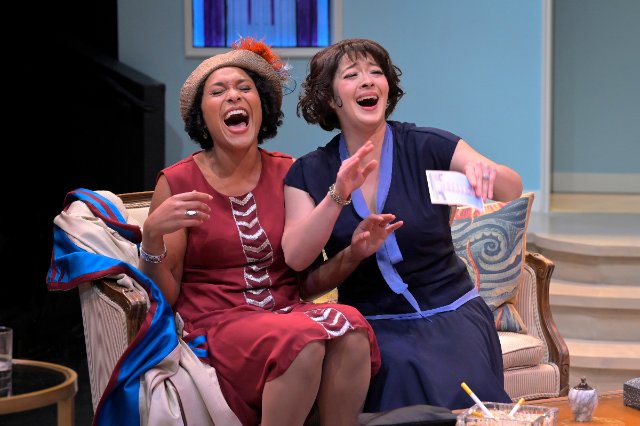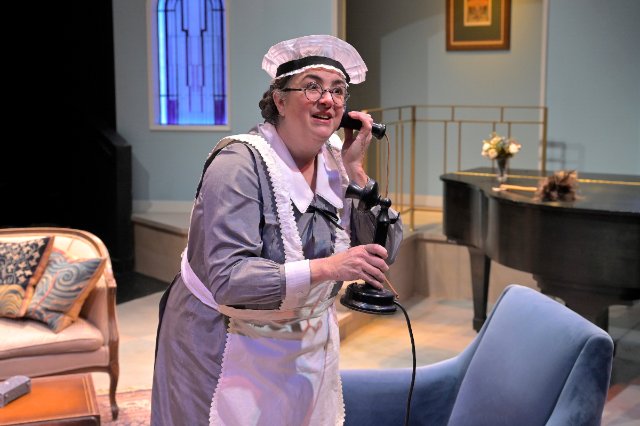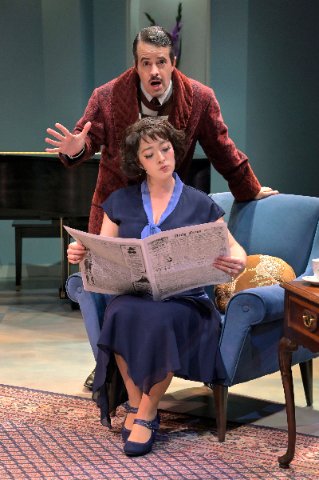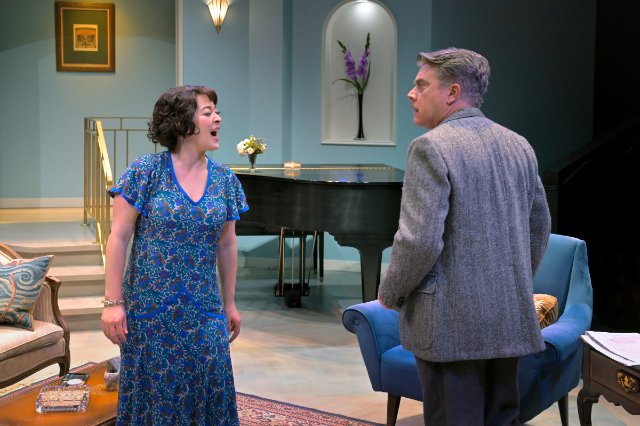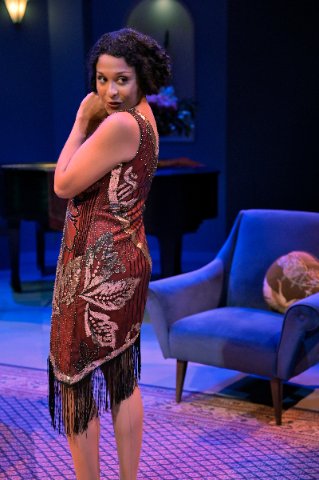Fallen Angels
Aurora Theatre Makes the Most of Thin Noel Coward Play
By: Victor Cordell - Oct 26, 2024
This year marks the 125th anniversary of the birth of Noël Coward, prompting a wave of revivals of his works, albeit that several have remained in the repertory since their premieres. Coward was a master of extracting humor from English manners and conventions, and his comedies have fared well on this side of the pond. A number like Blithe Spirit, Present Laughter, and Private Lives have had not only successful stage revivals but have been adapted for the movie screen.
Aurora Theatre Company has chosen to perform Fallen Angels. Premiered in 1925, it followed on the heels of Coward’s first major success, The Vortex. While not in the first tier of Coward’s works, Fallen Angels fills the house with laughs if well done, as this production does with a fine cast that keeps the chatty banter flowing.
The play is also of historical interest, as it was initially prohibited by the censor’s office from reaching the stage in the U.K. The offense? – references to admitted pre-marital sex and the explicit consideration of adultery. Clearly, the story line would induce a big yawn if written today, so for today’s audience the fun must come from the repartee.
Close friends Julia and Jane are from England’s privileged class. Each had a fling with a Frenchman, Maurice, several years previous before their respective marriages, which have now descended into comfortable tedium. When the women find that Maurice is coming to London while the husbands are away on a golf outing, their passions reignite with remembrances of Gallic romance. Jane even (jokingly?) wonders aloud “Wouldn’t it be terrible if a tree blew down at the golf course and killed Fred and Willy?” (They being the husbands.)
The narrative is dominated by the two women engaging in typical English parlor room behaviors. Kina Kantor is Julia, and Emily Newsome is Jane. Both are convincing in their wide-eyed, affected, faux-melodramatic exchanges which fashion the farcical tone. At an objective level, the written script seems somewhat arid and the exchanges trivial, but comedy is an art of timing and execution, and they manage to sustain it throughout.
But the funniest acting is from Cindy Goldfield as Julia’s peripatetic and snooty new maid, Saunders. In addition to one bit of physical comedy, Goldfield milks laughter from virtually everything out of her mouth, no matter how brief her message. At one point, Julia is playing the piano, and while leaning over a table clearing dishes, Saunders matter-of-factly mouths “D-flat” sotto voce in observing the incorrect D-natural that Julia played. That simple vocalization triggered roaring laughter because of Goldfield’s expression, her timing, and the context.
In another instance, Julia and Jane struggle singing a song in French, and Saunders breezes by singing it better. And when Saunders offers an antidote for a hangover, she notes “I once cured 20 natives with this formula.” It seems that Saunders has had diverse work and life experiences that equal or exceed those of “her betters,” a comment on the superciliousness of the upper classes, that is delivered with piercing wit.
When Julia’s husband Fred is ready to depart for the distant golf course he and Jane’s husband Willy will play, only Saunders knows to tell him that he will only need irons for the course! The men have a row on their trip as do the women as they await the arrival of Maurice. When the men return, wrong information is given and other information is misinterpreted, so that foolish squabbles ensue.
Michael Barrett Austin as Fred adds to the hilarity with his elastic facial expressions as does Kevin Clarke playing Willy with his gesticulations and hitching up his trousers. They petulantly mirror one another, each facing away, throwing back their heads, crossing their arms, and putting downward curls on their lips.
Apart from inferences that can be made about class distinction, other deeper meaning arises in the double standard for men and women. Also, there is an instance in which morality of actions by one’s own wife are assessed differently than the same actions by another’s wife.
Though the material for this play is fairly thin, Aurora does a fine job of making it work with overwrought but funny depictions. Kudos also to Nancy Carlin, the dialect coach, and Maggie Morgan for the period costumery.
Fallen Angels is written by Noël Coward, produced by Aurora Theatre Company, and plays on it stage at 2081 Addison Street, Berkeley, CA through November 17, 2024.

